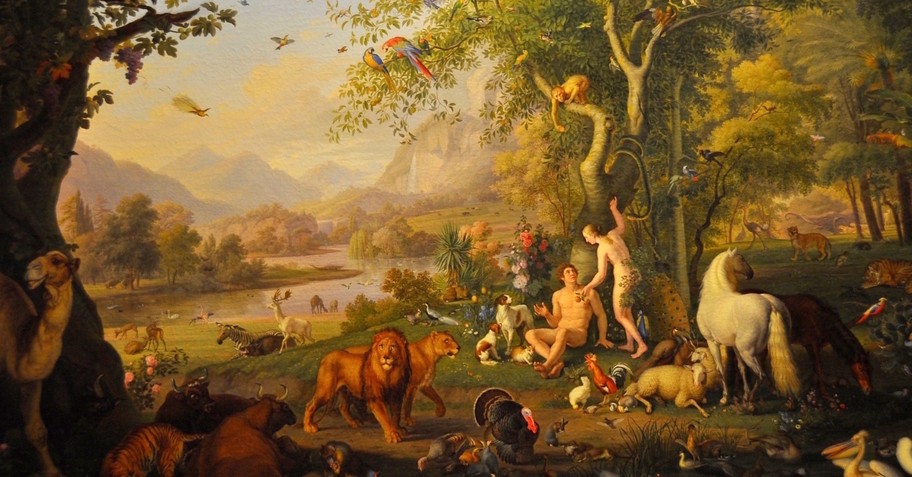“For I am not ashamed of the gospel, for it is the power of God for salvation to everyone who believes, to the Jew first and also to the Greek” (Romans 1:16).
In the New Testament, the word Gospel is translated from the Greek word euangelion, meaning good tidings, glad tidings, a good message.
Blue Letter Bible writes that the gospel is “the glad tidings of the kingdom of God soon to be set up, and subsequently also of Jesus the Messiah, the founder of this kingdom.” After the resurrection, the term “gospel” includes preaching about Jesus’ suffering on the cross to obtain eternal salvation of all mankind. After his death, Jesus was restored to life and exalted to the right hand of God in heaven. One day he will return in majesty to make all things new.
Photo credit: Unsplash/Aaron Owens

What Does the Bible Say about the Gospel?
By observing how the Bible speaks of the gospel, we learn that it is all about Jesus. Consider these references.
The gospel of the kingdom of God (Matthew 4:23; Luke 16:16)
The gospel of Jesus Christ (Mark 1:1)
The gospel of God (Mark 1:14)
The gospel of the grace of God (Acts 20:24)
The gospel of God’s Son (Romans 1:9)
The gospel of Christ (Romans 15:19)
The gospel of the glory of Christ (2 Corinthians 4:4)
The gospel of peace (Ephesians 6:15)
The gospel of our Lord Jesus (2 Thessalonians 1:8)
The gospel of the blessed God (1 Timothy 1:11)
The gospel of salvation (Ephesians 1:13)
Paul warns that any other gospel, other than the gospel of Jesus Christ, is a false gospel.
“I am amazed that you are so quickly deserting Him who called you by the grace of Christ, for a different gospel; which is really not another; only there are some who are disturbing you and want to distort the gospel of Christ. But even if we, or an angel from heaven, should preach to you a gospel contrary to what we have preached to you, he is to be accursed! As we have said before, so I say again now, if any man is preaching to you a gospel contrary to what you received, he is to be accursed!” (Galatians 1:6-9).
Vines defines the gospel simply. “It denotes the ‘good tidings’ of the Kingdom of God and of salvation through Christ, to be received by faith, on the basis of His expiatory death, His burial, resurrection, and ascension.” He observes that the apostle Paul uses the word “gospel” in two associated, yet distinct ways.
In the first, the gospel is viewed historically as the basic facts of the death, burial, and resurrection of Christ, as he explains in 1 Corinthians 15:3-4, “For I delivered to you as of first importance what I also received, that Christ died for our sins according to the Scriptures, and that He was buried, and that He was raised on the third day according to the Scriptures.”
In the second, the gospel is viewed doctrinally, in the interpretation of the historical facts. What are the characteristics of the gospel? How does the death, burial, and resurrection of Jesus affect our lives? Each of the New Testament writers expounds on this doctrinal aspect, as they describe the characteristics of the gospel.
It is the power of God for salvation (Romans 1:16)
It created a spiritual family (1 Corinthians 4:15; Ephesians 3:6; 1 Thessalonians 2:8)
It can be hindered (1 Corinthians 9:12)
It can be veiled (2 Corinthians 4:3)
It is light that opens our spiritual eyes (2 Corinthians 4:4)
It can be perverted and distorted (2 Corinthians 11:4; Galatians 1:6-9)
It is received by revelation (Galatians 1:11-12)
It is entrusted to men (Galatians 2:7; 1 Thessalonians 2:4)
It is truth (Colossians 1:5)
It is a mystery (Ephesians 6:19)
It is empowered by the Holy Spirit (1 Thessalonians 1:5)
It is God’s call to us (2 Thessalonians 2:14)
It is glorious (1 Timothy 1:11)
It abolishes death (2 Timothy 1:10)
It brings life and immortality (2 Timothy 1:10; 1 Peter 4:6)
It is a mystery to angels (1 Peter 1:12)
It is eternal (Revelation 14:6)
Photo credit: ©Getty Images/Sergio Yoneda

4 Essential Aspects of the Gospel
While the basic facts of Jesus’ death, burial, and resurrection are found in the New Testament, we must start at the beginning of the Bible, in the Old Testament, if we want to share the complete gospel.
There are four essential parts to the complete gospel.
1. Creation: God’s Original Blueprint
“Then God said, ‘Let Us make man in Our image, according to Our likeness; and let them rule over the fish of the sea and over the birds of the sky and over the cattle and over all the earth, and over every creeping thing that creeps on the earth.’ God created man in His own image, in the image of God He created him; male and female He created them” (Genesis 1:26-27).
“Then the Lord God formed man of dust from the ground, and breathed into his nostrils the breath of life; and man became a living being. … And the man and his wife were both naked and were not ashamed” (Genesis 2:7, 25).
Creation tells us the beginning of the story – how God always intended for our relationship with Him to be. God breathed His life into Adam and Eve; they were perfect, without sin. Creation also tells us that we exist because God desired us, and took special, intimate care in forming every human He created – not only Adam and Eve, but you and me as well (Psalm 139).
Photo credit: Flickr/faungg's-photos

2. The Fall: Sin Separates
“Now the serpent was more crafty than any beast of the field which the Lord God had made. And he said to the woman, ‘Indeed, has God said, ‘You shall not eat from any tree of the garden’?’ The woman said to the serpent, ‘From the fruit of the trees of the garden we may eat; but from the fruit of the tree which is in the middle of the garden, God has said, ‘You shall not eat from it or touch it, or you will die.’ The serpent said to the woman, ‘You surely will not die! For God knows that in the day you eat from it your eyes will be opened, and you will be like God, knowing good and evil.’ When the woman saw that the tree was good for food, and that it was a delight to the eyes, and that the tree was desirable to make one wise, she took from its fruit and ate; and she gave also to her husband with her, and he ate. Then the eyes of both of them were opened, and they knew that they were naked; and they sewed fig leaves together and made themselves loin coverings” (Genesis 3:1-7).
God gave Adam and Eve one rule: Do not eat of the tree of the knowledge of good and evil (Genesis 2:16-17). Sadly, Adam and Eve chose not to obey. The account of their disobedience is called the Fall, and it separated man from God, who is holy and cannot allow sin into His presence. When they sinned, they immediately suffered spiritual death, and their bodies began to die physically.
Because of Adam’s sin, all men are born separated from God (Romans 5:12). We are spiritually dead (Ephesians 2:1-3), and in need of new life. According to Romans 3:23, all have sinned, and the wages of sin is death (Romans 6:23). Either man would suffer eternal spiritual death for his own sin, or a substitutionary sacrifice for sin would have to be made.
God gave us the first reference to the gospel in the Garden, promising that one day, the Seed of the woman would defeat Satan, conquering death (Genesis 3:15). He also foreshadowed the sacrifice His own Son, Jesus, would make, as He sacrificed the lives of animals to cover Adam and Eve’s nakedness (Genesis 3:21).
Photo credit: Unsplash/Ian Espinosa

3. Redemption: God Pays the Price
“For while we were still helpless, at the right time Christ died for the ungodly. For one will hardly die for a righteous man; though perhaps for the good man someone would dare even to die. But God demonstrates His own love toward us, in that while we were yet sinners, Christ died for us. Much more then, having now been justified by His blood, we shall be saved from the wrath of God through Him. For if while we were enemies we were reconciled to God through the death of His Son, much more, having been reconciled, we shall be saved by His life” (Romans 5:6-10).
Christ’s death, burial, and resurrection are the heart of the gospel. From beginning to end, Scripture points to Jesus, and why He came. Jesus died to reconcile us back to the Father. His blood purchased our forgiveness, bringing us back into that perfect, holy relationship that Adam and Eve had before they sinned. His burial represents the death of our old nature, and His resurrection gives us our new life in Him.
Photo credit: ©Getty Images/Romolo Tavani

4. Restoration: God Restores Us Back to the Original
As believers, we are not only redeemed and reconciled to God through the payment of our sin by Christ’s death, but we have the hope of restoration. We are restored now spiritually (Colossians 3:1-4), and one day, our physical bodies will be restored.
“Now I say this, brethren, that flesh and blood cannot inherit the kingdom of God; nor does the perishable inherit the imperishable. Behold, I tell you a mystery; we will not all sleep, but we will all be changed, in a moment, in the twinkling of an eye, at the last trumpet; for the trumpet will sound, and the dead will be raised imperishable, and we will be changed. For this perishable must put on the imperishable, and this mortal must put on immortality” (1 Corinthians 15:50-53).
“For we know that if the earthly tent which is our house is torn down, we have a building from God, a house not made with hands, eternal in the heavens. For indeed in this house we groan, longing to be clothed with our dwelling from heaven, inasmuch as we, having put it on, will not be found naked. For indeed while we are in this tent, we groan, being burdened, because we do not want to be unclothed but to be clothed, so that what is mortal will be swallowed up by life” (2 Corinthians 5:1-4).
We know that God has accepted Christ’s death on the cross as payment for our sin because of the resurrection. Jesus defeated death, and in Christ we now have a new life on earth, to walk in fellowship and intimacy with God. We are restored back to a right relationship with Him spiritually. He gives us His Spirit to indwell us, as a kind of down-payment (a guarantee) for what life will be like one day, when all of creation is restored and we spend eternity with Him.
What Are We to Do with the Gospel?
The gospel is not some stagnant fable in an old book. It is the power of God for salvation, and it has been entrusted to all who believe.
We are to preach it to all the world (Matthew 24:14; Mark 13:10; 16:15)
We are to give our lives for it (Mark 8:35; Acts 20:24)
We are to believe it (Mark 1:15; Acts 15:7)
We are to give up all material possessions and relationships for it (Mark 10:29)
We are not to be ashamed of it (Romans 1:16; 2 Timothy 1:8)
We are to make it known (1 Corinthians 15:1)
We are to share it (Philippians 1:5-7; 4:3)
We are to defend it (Philippians 1:16)
We are to live worthy of it (Philippians 1:27)
We are to hope in it (Colossians 1:23)
We are to speak it boldly (1 Thessalonians 2:2)
We are to obey it (2 Thessalonians 1:8; 1 Peter 4:17)
We are to suffer for it (2 Timothy 1:8)
Have you believed the gospel? If so, who will you tell about Jesus today?
Photo credit: ©Getty Images/stockfour
Originally published February 23, 2024.







